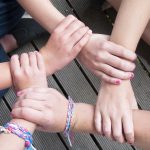“To Live and Love with a Dying World.” This conversation between Tim DeChristopher and Wendell Berry is quite good. Berry is a wily old fox, repeatedly refusing to be baited into despair or determinism. As he tells DeChristopher, “The effective boundaries of responsibility are your own limits.” (Recommended by John de Graaf.)
“How the Land Can Heal.” Matt Miller reviews Charles Massy’s Call of the Reed Warbler: A New Agriculture, a New Earth. Massy shows that as humans have been responsible for damaging ecosystems, they can also be responsible for restoring them: “Ecological healing will not come through human beings giving up a position as keystone species in the global ecosystem. Instead, human beings must promote healthier, not necessarily more limited, interactions with the landscape.”
“Flannery O’Connor Versus the Marvel Universe.” Jessica Hooten Wilson argues that the very profitable Marvel superhero movies are feeding us consumerist tripe: “Autonomy is the primary value at the end of the day. Despite the pretense of community, each Avenger fights for his or herself, according to what she or he believes is right.” O’Connor provides more substantive fare.
“Andrew Peterson’s Wingfeather Saga and Why We Need Fantasy.” Ginger Blomberg commends the four-part Wingfeather Saga. She’s right—this is a great series (and the Glipwood barber and gravedigger is named J. Bird, in a nod to readers of Jayber Crow).
“Community + God: Inextricable?” Marisa Casagrande reflects on where genuine educational reform needs to begin: “We crave a human-scaled life. The search for belonging, meaning, and truth is a universal one, shaped and enabled over the centuries by communities—faith and otherwise—of shared liturgies and understandings. Our longing for community is mysteriously connected to our longing for the divine, and more than ever, the public debate on education needs to begin here.”
“Climate Change and the Disappearing Fisherman of Tangier Island.” Addison Del Mastro reviews Chesapeake Requiem: A Year with the Watermen of Vanishing Tangier Island by Earl Swift. Swift explores the unique culture on Tangier Island and how its people are facing the prospect of rising waters: “What do you do when your place literally ceases to exist?”
“Public Thinker: Kevin Gannon Sets the Record Straight.” Kevin Kruse interviews Kevin Gannon about his efforts to think in public from a small, private school in Iowa. Their conversation reaffirms for me the value of a site like FPR whose writers and editors teach at places such as Northern State University, Palm Beach Atlantic University, Friends University, Augustana College, Mars Hill University, Spring Arbor University, Rochester College, etc. And of course many of our contributors labor in high school classrooms or work outside educational institutions altogether. There’s nothing inherently virtuous about teaching a 4-4 load at a small school far from a large, coastal city, but you don’t find such perspectives well-represented in our public discourse. (Thanks to John Fea, another professor doing great work at a liberal arts college, for posting this interview on his blog.)
“Life in Seattle, America’s Coronavirus Capital.” Margaret O’Mara finds the coronavirus humbling as it reminds us of our human limits and our local interdependencies: “It shouldn’t take a global pandemic to force us to slow down our routines, to appreciate the communities in which we live, to properly wash our hands. But it has. So life in Seattle will go on, quieter and more local than before.”
“The Coronavirus Is Coming for Trump’s Presidency.” Ross Douthat points out the irony that a nationalist president has failed to take a global pandemic seriously enough.
“Coronavirus and the Clash of Civilizations.” Bruno Maçães ponders what the different governmental responses to the coronavirus reveal about the underlying cultural differences between China and the West.
“In a Disaster that Calls for Isolation, Your Community Will Help You Survive.” Alissa Walker writes about the importance of thick social ties in helping people deal with the coronavirus.
“Coronavirus’ Lessons in Limits.” Damon Linker notes that the virus is a reminder of real limits, ones we can’t airbrush or Tweet away: “We haven’t, and never will, master everything. That’s the profound and painful lesson the coronavirus pandemic looks likely to teach us. There are limits after all.” (Recommended by Russell Fox.)







1 comment
Brian D. Miller
WB says in the Orion interview: What I would like to do, better than anything, would be to shoot a drone.
Amen, brother.
Comments are closed.